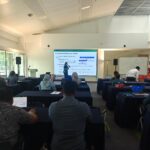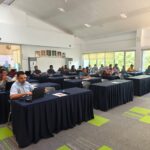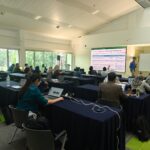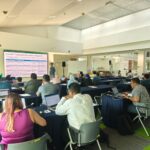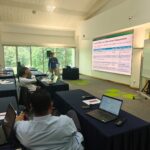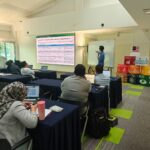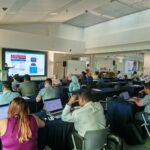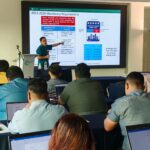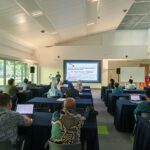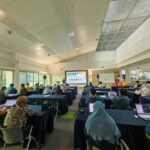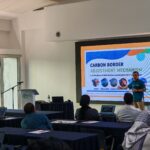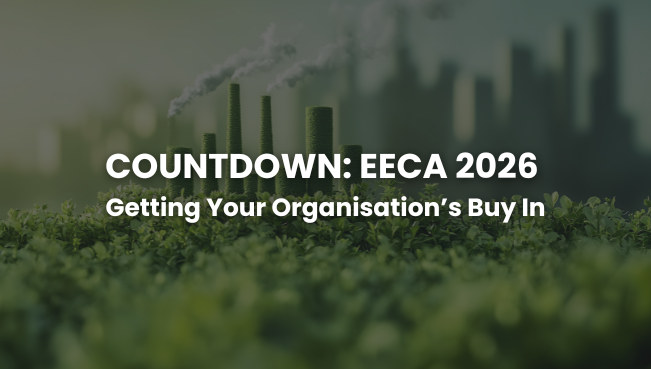In Article, Latest News
21st February 2025
Addressing value-chain emissions—the often overlooked “bottom-of-the-iceberg” carbon footprint of an organisation—is the key to unlocking true net-zero progress.
Recently, it was uplifting to see Malaysia’s water operators, led by SPAN, take a bold step toward net zero by launching a Corporate Value Chain (Scope 3) GHG emissions capacity-building workshop with MGTC, facilitated by UTM spinoff Optimal Systems Engineering (OPTIMISE). The workshop aimed to equip the water industry with the knowledge and skills to quantify, manage, and reduce emissions beyond their direct operations.
Why does this matter? Scope 3 emissions—indirect emissions from supply chains, procurement, and distribution—often make up the largest share of a company’s carbon footprint.
-
-
- For all industries consuming water in Malaysia, this means the future of accurate Scope 3 accounting using regional-specific emission factors.
- For the water sector, this means addressing everything from energy-intensive supply chains to chemical usage and waste management.
- Large energy consumers (consumers using >21600 GJ energy) shall also need to prepare to comply with the recently enforced Energy Efficiency Conservation Act (EECA).
-
🌊 Together with 📢 25 representatives from 13 water providers and regulators from across the country, the trainers from OPTIMISE dove into real-world scenarios in the water industry to uncover indirect emissions within the supply chain.
To achieve the workshop goals, the expert trainers leveraged:
-
-
- Role-playing & experience sharing – Engaging both trainers and participants to spark in-depth discussions on real-life GHG accounting challenges in the water sector.
- Infographics & visual guides – Illustrating emission sources across the entire value chain, from upstream to downstream.
- 15-in-1 Tailor-Made Case Study – A comprehensive case study designed for the water industry, covering all 15 Scope 3 categories for calculation exercises.
- Interactive working sessions – Hands-on activities with real-time feedback from both participants and trainers.
- Take-home assignment – A practical exercise on employee-related Scope 3 data collection to enhance training effectiveness and reinforce learning for water operators.
-
🌱 Impact on Malaysia’s Net-Zero Transition
-
-
- Strengthening Climate Action: Water operators are equipped with the skills to integrate emission reduction into daily operations, to align with Malaysia’s 2050 Net Zero goal.
- Industry Leadership: Water operators are becoming key players in driving climate-conscious procurement and operational efficiencies.
- Supply Chain Emissions Transparency: Fosters the establishment of state-specific water supply emission factors to support the Malaysian supply chain emissions accounting!
-
The partnership initiative reflects Malaysia’s commitment to sustainable water management and climate resilience. As industries step up in their sustainability journey, collaborative efforts like these ensure that no sector is left behind in the transition to a low-carbon economy.
💧🌍 Small changes lead to big impacts—one step closer to a sustainable Malaysia!
To learn more about how to prepare for the EECA, and to conduct GHG accounting and reporting for your organisation and communities in line with regulations and international standards, we invite you to join our upcoming workshop on understanding EECA and its impacts on companies and our GHG training programs, or contact us to arrange for an in-house training.
📧Email to us: [email protected]
📲Training Inquiry: http://wa.link/ypkabf
💻FB & LinkedIn: 𝗢𝗽𝘁𝗶𝗺𝗮𝗹 𝗦𝘆𝘀𝘁𝗲𝗺𝘀 𝗘𝗻𝗴𝗶𝗻𝗲𝗲𝗿𝗶𝗻𝗴

